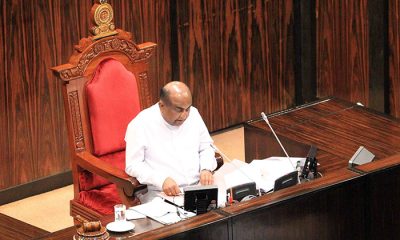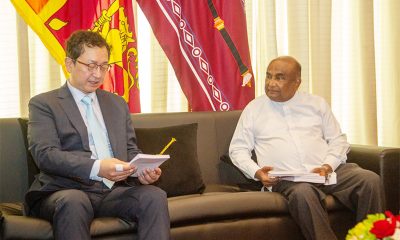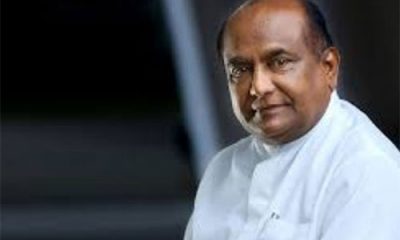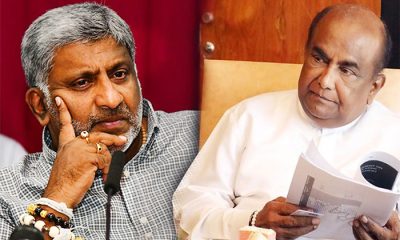Midweek Review
Warm welcome for war crimes agenda architect

By Shamindra Ferdinando
Former Secretary General of the United Nations, Ban Ki-moon, who engineered a high profile project that culminated with Sri Lanka betraying her armed forces, at the Geneva-based United Nations Human Rights Council (UNHRC), in early Oct, 2015, received a warm welcome here, recently.
The one-time South Korean Foreign Minister, served as the UNSG for two terms, from 2007-2016. Ban Ki-moon, who was here on the invitation of President Ranil Wickremesinghe, received an invitation, from Speaker Mahinda Yapa Abeywardena, to visit the Parliament. The former UN chief was in Sri Lanka in his current capacity as Chairman of the Seoul headquartered Global Green Growth Institute (GGGI). Ban Ki-moon also met Foreign Minister Ali Sabry, PC.
Ban Ki-moon first visited Sri Lanka, a few days after the combined security forces delivered a crushing defeat to the separatist Liberation Tigers of Tamil Eelam (LTTE), considered by many a pundit, till then, to be invincible, and brought about a successful conclusion to the long dragging war, on the morning of May 19, 2009, on the banks of the Nanthikadal lagoon.
Sri Lanka never bothered to, at least, to examine the despicable UN project that forced Sri Lanka to co-sponsor the accountability resolution. As a result of Ban Ki-moon’s actions, various interested parties stepped-up attacks on Sri Lanka. The Canadian declaration of former Presidents Mahinda Rajapaksa and Gotabaya Rajapaksa – the latter for his wartime role as the Secretary Ministry of Defence – as war criminals, stunned Sri Lanka. Ban Ki-moon, who facilitated that despicable project, was here as a guest of the Sri Lankan government.
In his capacity as the UNSG, he visited Colombo, for a second time, from August 31 to Sept. 2, 2016, after the conclusion of the war.
UN-LTTE secret talks
During Ban Ki-moon’s tenure as the UN Chief, he encouraged his mission in Colombo to mollycoddle the LTTE.
Let me examine the UN having secret talks with the LTTE in a bid to secure the release of two local Tamil workers, detained by the most ruthless terrorist movement. Sri Lanka never really inquired into the matter. The Rajapaksa government was not bothered at all. The Island exposed the secret UN pow-wow with the LTTE, in early 2007, as the Army was battling the LTTE on the Vanni west. At that time, the LTTE remained in control of the Vanni east.
A UN Panel of Experts (PoE) report on Accountability in Sri Lanka called for a comprehensive review of actions by the UN, during the war in Sri Lanka. The probe was meant to examine the implementation of the UN’s humanitarian and protection mandates.
It was the final recommendation made by the three-member PoE (Panel of Experts), comprising former Attorney General of Indonesia Marzuki Darusman (Chairman), US lawyer Steven R. Ratner, and NGO activist Yasmin Sooka. The PoE released an essentially one-sided report, on March 31, 2011, with no chance for Sri Lanka to challenge the allegations, levelled against the country, at least for three decades, because of a strange time bar placed by it, which only a highly manipulative body, like the UN could hatch, with its hierarchy and institutions well and truly infiltrated by the West.
The UN behaviour here has been such that during the height of the war, a Norwegian, who was the then UN Resident Representative in Sri Lanka, tried to humiliate the country by unilaterally turning its compound, in Colombo, into a refugee camp for Tamils. But the quick thinking then Foreign Minister, the late Lakshman Kadirgamar, told the Norwegian where to get off. The UN plan was to show the world Tamils are not safe in Colombo.
For want of a cohesive strategy, Sri Lanka never exploited the PoE’s recommendation to push for a thorough inquiry into the conduct of the UN personnel here. Had there been a proper strategy, Sri Lanka could have exposed the sordid relationship between the UN mission, in Colombo, and the LTTE. Even 13 years after the conclusion of the conflict, Sri Lanka is yet to examine how the UN, and its agencies, as well as the NGO community, prolonged the war. Did the UN system, in Sri Lanka, facilitate Western strategy? Did they work closely together to save the LTTE?
The UN turned a blind eye to what was happening on the ground. The LTTE made a strong bid to prevent civilians from crossing the front lines, into government controlled areas, on the Western front, in early 2007.
The LTTE obviously needed a human shield, made up of civilians, primarily to discourage the military from using heavy weapons against it. Secondly, the LTTE leadership also needed the civil population to ensure a steady supply of fresh recruits. Remember, the forced recruitment of children, by the LTTE, continued until the very end. The PoE, too, confirmed this fact. Instead of taking tangible action to thwart the LTTE move, the UN propagated lies that the Sri Lankan military was recruiting child soldiers on behalf of the breakaway LTTE faction, led by one-time Tiger Batticaloa commander, Karuna, who had switched allegiance to the government.
Tamils started fleeing LTTE-held areas as the famed 57 Division gradually stepped up pressure on the Vanni west front. Although the UN knew of the LTTE bid to stop the exodus of people, the world body remained quiet for obvious reasons.
The UN mission, in Colombo, stayed silent, even after the LTTE detained two of its Tamil employees for helping civilians to flee the war zone. The LTTE refused to release them, in spite of the UN repeatedly appealing to the top LTTE leadership. The so-called human rights champions remained tight lipped. These ever-green peace merchants are still active, with no shame, even though the war is long gone, but are funded to their gills by the West to continue to do their bidding, like so many other NGOs.
No one dared to voice concern over the new development. The Co-chairs to Sri Lanka’s peace process, namely Norway, the US, EU and Japan, conveniently remained silent even after The Island revealed the unprecedented detention of UN workers.
In the case of Japan, despite the US committing the horrendous war crime of dropping the first two atom bombs on highly congested Hiroshima and Nagasaki, when Japan was virtually on its knees, Tokyo is yet ready to jump any number of times, even if the US asks it to jump just once. If the self–proclaimed champions of human rights, in Washington, had wanted to ‘shock and awe’ the Japanese into surrender, it could have easily dropped those bombs on an isolated beach there, without causing so much death and destruction, among so many innocent civilians.
While confirming the high handed LTTE action, the then Foreign Secretary, Dr. Palitha Kohona, alleged that those who accused the government of death and destruction, at the drop of a hat, ignored what was happening in the Vanni mainland (‘LTTE detains UN workers’ – The Island, April 20, 2007).
The UN mission, in Colombo, declined to respond to The Island report. Those Colombo-based foreign correspondents, as well as locals, working for the international media, ignored the incident. The Illankai Tamil Arasu Kadchi (ITAK) led Tamil National Alliance (TNA), too, disregarded The Island revelation. Obviously, they felt the story would be inimical to the LTTE’s interest, and none of them wanted to cause an uproar against their “innocent” people-eating pet Tiger.
Further inquiries, by The Island, revealed as to how the UN engaged in secret negotiations, with the LTTE, in a bid to secure the release of its employees. An influential section of the Colombo-based diplomatic community tried to resolve the issue, without bringing it to the notice of the then government. The UN alerted the government, only after the LTTE refused to release its workers. The LTTE went to the extent of warning the UN that anyone disregarding its authority would have to face the consequences (‘UN had talks with the Tigers on the sly’ with strapline ‘UN workers in LTTE custody’ – The Island, April 23, 2007). Human rights champions remained mum.
Then Defence Secretary, Gotabaya Rajapaksa, in a brief interview with the writer, strongly criticized the Colombo-based UN bigwigs for having secret talks with the LTTE, following the abduction of two UN workers, in February 2007. The issue took centre stage at a meeting, chaired by Human Rights Minister, Mahinda Samarasinghe, to discuss the situation in the Northern and Eastern Provinces. Among those present were Colombo-based heads of diplomatic missions, including the then US Ambassador, Robert O. Blake, and senior officials representing the UN and its agencies. During the meeting, the UN acknowledged that it had decided against going public, believing the LTTE would eventually release them (‘Lanka urges UN not to shield Tigers’ – The Island, April 25, 2007).
Ban’s spokesperson sets the record straight
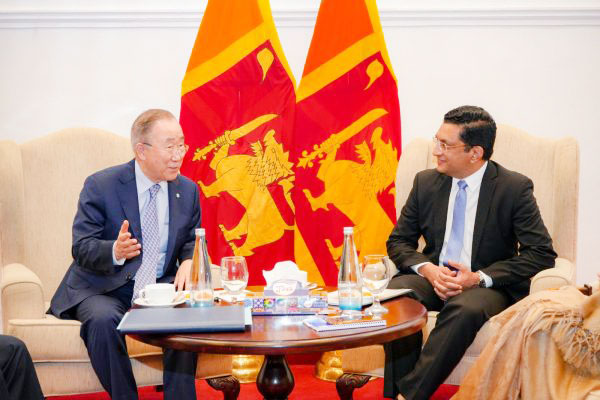
Former United Nations Secretary General, Ban Ki-moon, during whose term Sri Lanka effectively defeated the LTTE militarily, while much of the West claimed, like a mantra, that it could not be achieved by our security forces, shares a light moment with Foreign Minister Ali Sabry, PC, at his Ministry. on February 07 (Pic courtesy Foreign Ministry)
On the day The Island published Defence Secretary Rajapaksa’s criticism of UN action, the issue was raised at the daily UN media briefing, in New York. Responding to queries, UNSG Ban Ki-moon’s spokesperson, Michele Montas, revealed that the UN mission in Colombo hadn’t informed New York about the abduction of its employees and holding them hostage by the LTTE. Montas was speaking about the despicable act over 10 weeks after the incident. Wouldn’t it be interesting to examine the accountability, on the part of the UN mission in Colombo? Referring to The Island exposure, Montas said: “We don’t have any confirmation of that newspaper report. We have heard them. As soon as we have confirmation, we’ll get something for you on that. I am checking with the UN presence in Sri Lanka”.
Stressing that the UN mission, in Colombo, hadn’t confirmed the newspaper reports, Montas said: “I don’t know. We don’t have any confirmation. They haven’t confirmed those reports. I heard them through the press. (‘UN HQ admits Colombo office kept it in the dark’, with strapline ‘SL government criticizes UN inaction’ – The Island, April 28, 2007).
The UN cannot absolve itself of the responsibility for the LTTE forcing the entire Vanni population to retreat towards the Mullaitivu coast, along with its fighting cadre, and the leadership, where the group finally collapsed, in May 2009, after much of the civilian shield, it forcefully held, escaped to military liberated areas, ending their nightmare.
The UN was careful not to interfere with the LTTE operations, though it knew the lives of UN workers, as well as their dependents, were in jeopardy. Still the UN decided to secretly negotiate with the LTTE, instead of demanding their immediate release. The plight of UN workers and their families came to light again, in late September 2009, when Defence Secretary Gotabaya Rajapaksa ordered UN international staff, as well as foreign representatives of other INGOs, to vacate the Vanni region. Having agreed to complete the withdrawal, within three weeks, the then Resident Representative, Neil Bhune, tried to evacuate families of local UN staff (‘Government wants UN, INGO pullout completed by September 29’ – The Island, September 17, 2008).
Although the LTTE rejected the UN’s move, its Colombo mission didn’t make a big fuss. Human rights defenders, too, turned a blind eye to the rapidly deteriorating situation on the Vanni front. In spite of the UN seeking three weeks to complete the withdrawal, except the project manager of INGO, called ZOA, all representatives quit the war zone, by September 16, 2008. The Inter-Agency Standing Committee, which represented all UN agencies and other INGOs active in Sri Lanka, acknowledged the LTTE’s refusal to allow over 500 local staffers of INGOs to leave (‘Attempt to evacuate Tamil INGO, UN workers thwarted’ – The Island, September 29, 2008).
Subsequently, the ZOA manager returned to Vavuniya, on September 26, 2008, over a week after all other foreign nationals quit the LTTE-held area. The then ZOA Country Director, Bernard Jaspers Faijer, made a desperate attempt to shield the ZOA employee accused of joining the LTTE (‘ZOA defends employee facing expulsion’ – The Island, September 29, 2008). The Island reportage included a front page lead story, headlined ‘INGO kingpin with Italian passport joins LTTE as a fighter’, with a strapline ‘ZOA informs Defence Ministry of its project Manager’s decision on September 27, 2008’.
The UN never objected to the LTTE strategy. The TNA, as well as NGOs, who were shedding crocodile tears for Tamil civilians, never asked the LTTE to release them. The LTTE knew it wouldn’t have lasted a week if it allowed the civilians to leave. By March/April 2009, the LTTE fighting cadre had been trapped in a coastal pocket, in the Mullaitivu district.
Let me reproduce what the PoE said in its report on the LTTE’s refusal to release civilians (Page 28/Point 98): “In spite of the futility of their military situation, the LTTE not only refused to surrender, but also continued to prevent civilians from leaving the area, ensuring their continued presence as a human buffer. It forced civilians to help build military installations and fortifications or undertake other forced labour. It also intensified its practice of forced recruitment, including children, to swell their dwindling ranks. As the LTTE recruitment increased, parents actively resisted, and families took increasingly desperate measures to protect their children from recruitment. (Page 28/Point 99) “…Beginning February 2009, the LTTE commenced a policy of shooting civilians who attempted to escape, and, to this end, cadres took up positions where they could spot civilians who might try to break out.”
One of Sri Lanka’s famed career diplomats, D.B. Dhanapala, succinctly discussed the issue of accountability when he addressed the Lessons Learnt and Reconciliation Commission (LLRC), headed by one-time Attorney General, the late C. R. de Silva, on Aug. 25, 2010. Dhanapala, in his submissions, said: “Now I think it is important for us to expand that concept to bring in the culpability of those members of the international community who have subscribed to the situation that has caused injury to the civilians of a nation. I talk about the way in which terrorist groups are given sanctuary; harboured; and supplied with arms and training by some countries with regard to their neighbours or with regard to other countries. We know that in our case this has happened, and I don’t want to name countries, but even countries which have allowed their financial procedures and systems to be abused in such a way that money can flow from their countries in order to buy arms and ammunition that cause deaths, maiming and destruction of property in Sri Lanka are to blame and there is therefore a responsibility to protect our civilians and the civilians of other nations from that kind of behaviour on the part of members of the international community. And I think this is something that will echo within many countries in the Non-Aligned Movement, where Sri Lanka has a much respected position and where I hope we will be able to raise this issue.”
Dhanapala also stressed on the accountability on the part of Western governments, which conveniently turned a blind eye to massive fundraising operations in their countries, in support of the LTTE operations. It is no secret that the LTTE would never have been able to emerge as a conventional fighting force without having the wherewithal abroad, mainly in the Western countries, to procure arms, ammunition and equipment.
Even Ban Ki-moon would have been surprised by the reception he received, in Colombo, recently. Ban Ki-moon’s PoE recommended that submissions/complaints received and used to determine that 40,000 civilians perished wouldn’t be subject to scrutiny till 2031. The ex-UNSG is actually the architect of a project to humiliate Sri Lanka. Yet he received an invitation to visit the Sri Lanka Parliament.
Our clueless politicians, and security set up, still reeling from the hiding they got from the mainly foreign-funded and directed “peaceful” Aragalaya, have yet to recover their bearings, let alone their senses. The unprecedented violence, unleashed on May 09, and, thereafter, against government politicians, though many of them may have deserved a hiding, was no spontaneous local eruption. It certainly had the markings of Western intelligence and their quislings here as was the case in what happened in Libya, Syria, and Iraq, etc. If Tokyo can continue to be such a blind worshipper of white man and is willingly heading to an Armageddon, which no one can win, our local bootlickers, now lording over us, will drag us all to a similar fate. Maybe the good book will be proved right: the meek shall inherit the earth.
Midweek Review
Daya Pathirana killing and transformation of the JVP

JVP leader Somawansa Amarasinghe, who returned to Sri Lanka in late Nov, 2001, ending a 12-year self-imposed exile in Europe, declared that India helped him flee certain death as the government crushed his party’s second insurrection against the state in the ’80s, using even death squads. Amarasinghe, sole surviving member of the original politburo of the JVP, profusely thanked India and former Prime Minister V.P. Singh for helping him survive the crackdown. Neither the JVP nor India never explained the circumstances New Delhi facilitated Amarasinghe’s escape, particularly against the backdrop of the JVP’s frenzied anti-India campaign. The JVP has claimed to have killed Indian soldiers in the East during the 1987-1989 period. Addressing his first public meeting at Kalutara, a day after his arrival, Amarasinghe showed signs that the party had shed its anti-India policy of yesteryears. The JVPer paid tribute to the people of India, PM Singh and Indian officials who helped him escape.
By Shamindra Ferdinando
Forty years after the killing of Daya Pathirana, the third head of the Independent Student Union (ISU) by the Socialist Students’ Union (SSU), affiliated with the JVP, one-time Divaina journalist Dharman Wickremaretne has dealt with the ISU’s connections with some Tamil terrorist groups. The LTTE (Liberation Tigers of Tamil Eelam) hadn’t been among them, according to Wickremaretne’s Daya Pathirana Ghathanaye Nodutu Peththa (The Unseen Side of Daya Pathirana Killing), the fifth of a series of books that discussed the two abortive insurgencies launched by the JVP in 1971 and the early ’80s.
Pathirana was killed on 15 December, 1986. His body was found at Hirana, Panadura. Pathirana’s associate, Punchiralalage Somasiri, also of the ISU, who had been abducted, along with Pathirana, was brutally attacked but, almost by a miracle, survived to tell the tale. Daya Pathirana was the second person killed after the formation of the Deshapremi Janatha Vyaparaya (DJV), the macabre wing of the JVP, in early March 1986. The DJV’s first head had been JVP politburo member Saman Piyasiri Fernando.
Its first victim was H. Jayawickrema, Principal of Middeniya Gonahena Vidyalaya, killed on 05 December, 1986. The JVP found fault with him for suspending several students for putting up JVP posters.
Wickremaretne, who had been relentlessly searching for information, regarding the violent student movements for two decades, was lucky to receive obviously unconditional support of those who were involved with the SSU and ISU as well as other outfits. Somasiri was among them.
Deepthi Lamaheva had been ISU’s first leader. Warnakulasooriya succeeded Lamahewa and was replaced by Pathirana. After Pathirana’s killing K.L. Dharmasiri took over. Interestingly, the author justified Daya Pathirana’s killing on the basis that those who believed in violence died by it.
Wickremaretne’s latest book, the fifth of the series on the JVP, discussed hitherto largely untouched subject – the links between undergraduates in the South and northern terrorists, even before the July 1983 violence in the wake of the LTTE killing 12 soldiers, and an officer, while on a routine patrol at Thinnavely, Jaffna.
The LTTE emerged as the main terrorist group, after the Jaffna killings, while other groups plotted to cause mayhem. The emergence of the LTTE compelled the then JRJ government to transfer all available police and military resources to the North, due to the constant attacks that gradually weakened government authority there. In Colombo, ISU and Tamil groups, including the PLOTE (People’s Liberation Tigers of Tamil Eelam) enhanced cooperation. Wickremaretne shed light on a disturbing ISU-PLOTE connection that hadn’t ever been examined or discussed or received sufficient public attention.
In fact, EROS (Eelam Revolutionary Organisation of Students), too, had been involved with the ISU. According to the author, the ISU had its first meeting on 10 April, 1980. In the following year, ISU established contact with the EPRLF (Eelam People’s Revolutionary Liberation Front). The involvement of ISU with the PLOTE and Wickremaretne revealed how the SSU probed that link and went to the extent of secretly interrogating ISU members in a bid to ascertain the details of that connection. ISU activist Pradeep Udayakumara Thenuwara had been forcibly taken to Sri Jayewardenepura University where he was subjected to strenuous interrogation by SSU in a bid to identify those who were involved in a high profile PLOTE operation.
The author ascertained that the SSU suspected Pathirana’s direct involvement in the PLOTE attack on the Nikaweratiya Police Station, and the Nikaweratiya branch of the People’s Bank, on April 26, 1985. The SSU believed that out of a 16-member gang that carried out the twin attacks, two were ISU members, namely Pathirana, and another identified as Thalathu Oya Seneviratne, aka Captain Senevi.
The SSU received information regarding ISU’s direct involvement in the Nikaweratiya attacks from hardcore PLOTE cadre Nagalingam Manikkadasan, whose mother was a Sinhalese and closely related to JVP’s Upatissa Gamanayake. The LTTE killed Manikkadasan in a bomb attack on a PLOTE office, in Vavuniya, in September, 1999. The writer met Manikkadasan, at Bambapalitiya, in 1997, in the company of Dharmalingham Siddharthan. The PLOTE had been involved in operations in support of President Chandrika Bandaranaike Kumaratunga’s administration.
It was President Premadasa who first paved the way for Tamil groups to enter the political mainstream. In spite of some of his own advisors expressing concern over Premadasa’s handling of negotiations with the LTTE, he ordered the then Elections Commissioner Chandrananda de Silva to grant political recognition to the LTTE. The LTTE’s political wing PFLT (People’s Front of Liberation Tigers) received recognition in early December, 1989, seven months before Eelam War II erupted.
Transformation of ISU
The author discussed the formation of the ISU, its key members, links with Tamil groups, and the murderous role in the overall counter insurgency campaign during JRJ and Ranasinghe Premadasa presidencies. Some of those who had been involved with the ISU may have ended up with various other groups, even civil society groups. Somasiri, who was abducted along with Pathirana at Thunmulla and attacked with the same specialised knife, but survived, is such a person.
Somasiri contested the 06 May Local Government elections, on the Jana Aragala Sandhanaya ticket. Jana Aragala Sandhanaya is a front organisation of the Frontline Socialist Party/ Peratugaami pakshaya, a breakaway faction of the JVP that also played a critical role in the violent protest campaign Aragalaya against President Gotabaya Rajapaksa. That break-up happened in April 2012, The wartime Defence Secretary, who secured the presidency at the 2019 presidential election, with 6.9 mn votes, was forced to give up office, in July 2022, and flee the country.
Somasiri and Jana Aragala Sandhanaya were unsuccessful; the group contested 154 Local Government bodies and only managed to secure only 16 seats whereas the ruling party JVP comfortably won the vast majority of Municipal Councils, Urban Councils and Pradeshiya Sabhas.
Let us get back to the period of terror when the ISU was an integral part of the UNP’s bloody response to the JVP challenge. The signing of the Indo-Lanka accord, in late July 1987, resulted in the intensification of violence by both parties. Wickremaretne disclosed secret talks between ISU leader K.L. Dharmasiri and the then Senior SSP (Colombo South) Abdul Cader Abdul Gafoor to plan a major operation to apprehend undergraduates likely to lead protests against the Indo-Lanka accord. Among those arrested were Gevindu Cumaratunga and Anupa Pasqual. Cumaratunga, in his capacity as the leader of civil society group Yuthukama, that contributed to the campaign against Yahapalanaya, was accommodated on the SLPP National List (2020 to 2024) whereas Pasqual, also of Yuthukama, entered Parliament on the SLPP ticket, having contested Kalutara. Pasqual switched his allegiance to Ranil Wickremesinghe after Gotabaya Rajapaksa’s ouster in July 2022.
SSU/JVP killed K.L. Dharmasiri on 19 August, 1989, in Colomba Kochchikade just a few months before the Army apprehended and killed JVP leader Rohana Wijeweera. Towards the end of the counter insurgency campaign, a section of the ISU was integrated with the military (National Guard). The UNP government had no qualms in granting them a monthly payment.
Referring to torture chambers operated at the Law Faculty of the Colombo University and Yataro operations centre, Havelock Town, author Wickremaretne underscored the direct involvement of the ISU in running them.
Maj. Tuan Nizam Muthaliff, who had been in charge of the Yataro ‘facility,’ located near State Defence Minister Ranjan Wijeratne’s residence, is widely believed to have shot Wijeweera in November, 1989. Muthaliff earned the wrath of the LTTE for his ‘work’ and was shot dead on May 3, 2005, at Polhengoda junction, Narahenpita. At the time of Muthaliff’s assassination, he served in the Military Intelligence.
Premadasa-SSU/JVP link
Ex-lawmaker and Jathika Chinthanaya Kandayama stalwart Gevindu Cumaratunga, in his brief address to the gathering, at Wickremaretne’s book launch, in Colombo, compared Daya Pathirana’s killing with the recent death of Nandana Gunatilleke, one-time frontline JVPer.
Questioning the suspicious circumstances surrounding Gunatilleke’s demise, Cumaratunga strongly emphasised that assassinations shouldn’t be used as a political tool or a weapon to achieve objectives. The outspoken political activist discussed the Pathirana killing and Gunatilleke’s demise, recalling the false accusations directed at the then UNPer Gamini Lokuge regarding the high profile 1986 hit.
Cumaratunga alleged that the SSU/JVP having killed Daya Pathirana made a despicable bid to pass the blame to others. Turning towards the author, Cumaratunga heaped praise on Wickremaretne for naming the SSU/JVP hit team and for the print media coverage provided to the student movements, particularly those based at the Colombo University.
Cumaratunga didn’t hold back. He tore into SSU/JVP while questioning their current strategies. At one point a section of the audience interrupted Cumaratunga as he made references to JVP-led Jathika Jana Balawegaya (JJB) and JJB strategist Prof. Nirmal Dewasiri, who had been with the SSU during those dark days. Cumaratunga recalled him attending Daya Pathirana’s funeral in Matara though he felt that they could be targeted.
Perhaps the most controversial and contentious issue raised by Cumaratunga was Ranasinghe Premadasa’s alleged links with the SSU/JVP. The ex-lawmaker reminded the SSU/JVP continuing with anti-JRJ campaign even after the UNP named Ranasinghe Premadasa as their candidature for the December 1988 presidential election. His inference was clear. By the time Premadasa secured the presidential nomination he had already reached a consensus with the SSU/JVP as he feared JRJ would double cross him and give the nomination to one of his other favourites, like Gamini Dissanayake or Lalith Athulathmudali.
There had been intense discussions involving various factions, especially among the most powerful SSU cadre that led to putting up posters targeting Premadasa at the Colombo University. Premadasa had expressed surprise at the appearance of such posters amidst his high profile ‘Me Kawuda’ ‘Monawada Karanne’poster campaign. Having questioned the appearance of posters against him at the Colombo University, Premadasa told Parliament he would inquire into such claims and respond. Cumaratunga alleged that night UNP goons entered the Colombo University to clean up the place.
The speaker suggested that the SSU/JVP backed Premadasa’s presidential bid and the UNP leader may have failed to emerge victorious without their support. He seemed quite confident of his assertion. Did the SSU/JVP contribute to Premadasa’s victory at one of the bloodiest post-independence elections in our history.
Cumaratunga didn’t forget to comment on his erstwhile comrade Anupa Pasqual. Alleging that Pasqual betrayed Yuthukama when he switched allegiance to Wickremesinghe, Cumaratunga, however, paid a glowing tribute to him for being a courageous responder, as a student leader.
SSU accepts Eelam
One of the most interesting chapters was the one that dealt with the Viplawadi Janatha Vimukthi Peramuna/Revolutionary Janatha Vimukthi Peramuna (RJVP), widely known as the Vikalpa Kandaya/Alternative Group and the ISU mount joint campaigns with Tamil groups. Both University groups received weapons training, courtesy PLOTE and EPRLF, both here, and in India, in the run-up to the so-called Indo-Lanka Peace Accord. In short, they accepted Tamils’ right to self-determination.
The author also claimed that the late Dharmeratnam Sivaram had been in touch with ISU and was directly involved in arranging weapons training for ISU. No less a person than PLOTE Chief Uma Maheswaran had told the author that PLOTE provided weapons training to ISU, free of charge ,and the JVP for a fee. Sivaram, later contributed to several English newspapers, under the pen name Taraki, beginning with The Island. By then, he propagated the LTTE line that the war couldn’t be brought to a successful conclusion through military means. Taraki was abducted near the Bambalapitiya Police Station on the night of 28 April, 2005, and his body was found the following day.
The LTTE conferred the “Maamanithar” title upon the journalist, the highest civilian honour of the movement.
In the run up to the Indo-Lanka Peace Accord, India freely distributed weapons to Tamil terrorist groups here who in turn trained Sinhala youth.
Had it been part of the overall Indian destabilisation project, directed at Sri Lanka? PLOTE and EPRLF couldn’t have arranged weapons training in India as well as terrorist camps here without India’s knowledge. Unfortunately, Sri Lanka never sought to examine the origins of terrorism here and identified those who propagated and promoted separatist ideals.
Exactly a year before Daya Pathirana’s killing, arrangements had been made by ISU to dispatch a 15-member group to India. But, that move had been cancelled after law enforcement authorities apprehended some of those who received weapons training in India earlier. Wickremaretne’s narrative of the students’ movement, with the primary focus of the University of Colombo, is a must read. The author shed light on the despicable Indian destabilisation project that, if succeeded, could have caused and equally destructive war in the South. In a way, Daya Pathirana’s killing preempted possible wider conflict in the South.
Gevindu Cumaratunga, in his thought-provoking speech, commented on Daya Pathirana. At the time Cumaratunga entered Colombo University, he hadn’t been interested at all in politics. But, the way the ISU strongman promoted separatism, influenced Cumaratunga to counter those arguments. The ex-MP recollected how Daya Pathirana, a heavy smoker (almost always with a cigarette in his hand) warned of dire consequences if he persisted with his counter views.
In fact, Gevindu Cumaratunga ensured that the ’80s terror period was appropriately discussed at the book launch. Unfortunately, Wickremaretne’s book didn’t cause the anticipated response, and a dialogue involving various interested parties. It would be pertinent to mention that at the time the SSU/JVP decided to eliminate Daya Pathirana, it automatically received the tacit support of other student factions, affiliated to other political parties, including the UNP.
Soon after Anura Kumara Dissanayake received the leadership of the JVP from Somawansa Amarasinghe, in December 2014, he, in an interview with Saroj Pathirana of BBC Sandeshaya, regretted their actions during the second insurgency. Responding to Pathirana’s query, Dissanayake not only regretted but asked for forgiveness for nearly 6,000 killings perpetrated by the party during that period. Author Wickremaretne cleverly used FSP leader Kumar Gunaratnam’s interview with Upul Shantha Sannasgala, aired on Rupavahini on 21 November, 2019, to remind the reader that he, too, had been with the JVP at the time the decision was taken to eliminate Daya Pathirana. Gunaratnam moved out of the JVP, in April 2012, after years of turmoil. It would be pertinent to mention that Wimal Weerawansa-Nandana Gunatilleke led a group that sided with President Mahinda Rajapaksa during his first term, too, and had been with the party by that time. Although the party split over the years, those who served the interests of the JVP, during the 1980-1990 period, cannot absolve themselves of the violence perpetrated by the party. This should apply to the JVPers now in the Jathika Jana Balawegaya (JJB), a political party formed in July 2019 to create a platform for Dissanayake to contest the 2019 presidential election. Dissanayake secured a distant third place (418,553 votes [3.16%])
However, the JVP terrorism cannot be examined without taking into JRJ’s overall political strategy meant to suppress political opposition. The utterly disgusting strategy led to the rigged December 1982 referendum that gave JRJ the opportunity to postpone the parliamentary elections, scheduled for August 1983. JRJ feared his party would lose the super majority in Parliament, hence the irresponsible violence marred referendum, the only referendum ever held here to put off the election. On 30 July, 1983, JRJ proscribed the JVP, along with the Nawa Sama Samaja Party and the Communist Party, on the false pretext of carrying out attacks on the Tamil community, following the killing of 13 soldiers in Jaffna.
Under Dissanayake’s leadership, the JVP underwent total a overhaul but it was Somawansa Amarasinghe who paved the way. Under Somawansa’s leadership, the party took the most controversial decision to throw its weight behind warwinning Army Chief General (retd) Sarath Fonseka at the 2010 presidential election. That decision, the writer feels, can be compared only with the decision to launch its second terror campaign in response to JRJ’s political strategy. How could we forget Somawansa Amarasinghe joining hands with the UNP and one-time LTTE ally, the Tamil National Alliance (TNA), to field Fonseka? Although they failed in that US-backed vile scheme, in 2010, success was achieved at the 2015 presidential election when Maithripala Sirisena was elected.
Perhaps, the JVP took advantage of the developing situation (post-Indo-Lanka Peace Accord), particularly the induction of the Indian Army here, in July 1987, to intensify their campaign. In the aftermath of that, the JVP attacked the UNP parliamentary group with hand grenades in Parliament. The August 1987 attack killed Matara District MP Keerthi Abeywickrema and staffer Nobert Senadheera while 16 received injuries. Both President JRJ and Prime Minister Ranasinghe Premadasa had been present at the time the two hand grenades were thrown at the group.
Had the JVP plot to assassinate JRJ and Premadasa succeeded in August 1987, what would have happened? Gevindu Cumaratunga, during his speech also raised a very interesting question. The nationalist asked where ISU Daya Pathirana would have been if he survived the murderous JVP.
Midweek Review
Reaping a late harvest Musings of an Old Man

I am an old man, having reached “four score and five” years, to describe my age in archaic terms. From a biological perspective, I have “grown old.” However, I believe that for those with sufficient inner resources, old age provides fertile ground to cultivate a new outlook and reap a late harvest before the sun sets on life.
Negative Characterisation of Old Age
My early medical education and training familiarised me with the concept of biological ageing: that every living organism inevitably undergoes progressive degeneration of its tissues over time. Old age is often associated with disease, disability, cognitive decline, and dependence. There is an inkling of futility, alienation, and despair as one approaches death. Losses accumulate. As Shakespeare wrote in Hamlet, “When sorrows come, they come not single spies, but in battalions.” Doctors may experience difficulty in treating older people and sometimes adopt an attitude of therapeutic nihilism toward a life perceived to be in decline.
Categorical assignment of symptoms is essential in medical practice when arriving at a diagnosis. However, placing an individual into the box of a “geriatric” is another matter, often resulting in unintended age segregation and stigmatisation rather than liberation of the elderly. Such labelling may amount to ageism. It is interesting to note that etymologically, the English word geriatric and the Sanskrit word jara both stem from the Indo-European root geront, meaning old age and decay, leading to death (jara-marana).
Even Sigmund Freud (1875–1961), the doyen of psychoanalysis, who influenced my understanding of personality structure and development during my psychiatric training, focused primarily on early development and youth, giving comparatively little attention to the psychology of old age. He believed that instinctual drives lost their impetus with ageing and famously remarked that “ageing is the castration of youth,” implying infertility not only in the biological sense. It is perhaps not surprising that Freud began his career as a neurologist and studied cerebral palsy.
Potential for Growth in Old Age
The model of human development proposed by the psychologist Erik Erikson (1902–1994), which he termed the “eight stages of man,” is far more appealing to me. His theory spans the entire life cycle, with each stage presenting a developmental task involving the negotiation of opposing forces; success or failure influences the trajectory of later life. The task of old age is to reconcile the polarity between “ego integrity” and “ego despair,” determining the emotional life of the elderly.
Ego integrity, according to Erikson, is the sense of self developed through working through the crises (challenges) of earlier stages and accruing psychological assets through lived experience. Ego despair, in contrast, results from the cumulative impact of multiple physical and emotional losses, especially during the final stage of life. A major task of old age is to maintain dignity amidst such emotionally debilitating forces. Negotiating between these polarities offers the potential for continued growth in old age, leading to what might be called a “meaningful finish.”
I do not dispute the concept of biological ageing. However, I do not regard old age as a terminal phase in which growth ceases and one is simply destined to wither and die. Though shadowed by physical frailty, diminishing sensory capacities and an apparent waning of vitality, there persists a proactive human spirit that endures well into late life. There is a need in old age to rekindle that spirit. Ageing itself can provide creative opportunities and avenues for productivity. The aim is to bring life to a meaningful close.
To generate such change despite the obstacles of ageing — disability and stigmatisation — the elderly require a sense of agency, a gleam of hope, and a sustaining aspiration. This may sound illusory; yet if such illusions are benign and life-affirming, why not allow them?
Sharon Kaufman, in her book The Ageless Self: Sources of Meaning in Late Life, argues that “old age” is a social construct resisted by many elders. Rather than identifying with decline, they perceive identity as a lifelong process despite physical and social change. They find meaning in remaining authentically themselves, assimilating and reformulating diverse life experiences through family relationships, professional achievements, and personal values.
Creative Living in Old Age
We can think of many artists, writers, and thinkers who produced their most iconic, mature, or ground-breaking work in later years, demonstrating that creativity can deepen and flourish with age. I do not suggest that we should all aspire to become a Monet, Picasso, or Chomsky. Rather, I use the term “creativity” in a broader sense — to illuminate its relevance to ordinary, everyday living.
Endowed with wisdom accumulated through life’s experiences, the elderly have the opportunity for developmental self-transformation — to connect with new identities, perspectives, and aspirations, and to engage in a continuing quest for purpose and meaning. Such a quest serves an essential function in sustaining mental health and well-being.
Old age offers opportunities for psychological adaptation and renewal. Many elders use the additional time afforded by retirement to broaden their knowledge, pursue new goals, and cultivate creativity — an old age characterised by wholeness, purpose, and coherence that keeps the human spirit alive and growing even as one’s days draw to a close.
Creative living in old age requires remaining physically, cognitively, emotionally, and socially engaged, and experiencing life as meaningful. It is important to sustain an optimistic perception of health, while distancing oneself from excessive preoccupation with pain and trauma. Positive perceptions of oneself and of the future help sustain well-being. Engage in lifelong learning, maintain curiosity, challenge assumptions — for learning itself is a meaning-making process. Nurture meaningful relationships to avoid disengagement, and enter into respectful dialogue, not only with those who agree with you. Cultivate a spiritual orientation and come to terms with mortality.
The developmental task of old age is to continue growing even as one approaches death — to reap a late harvest. As Rabindranath Tagore expressed evocatively in Gitanjali [‘Song Offerings’], which won him the Nobel Prize:: “On the day when death will knock at thy door, what wilt thou offer to him?
Oh, I will set before my guest the full vessel of my life — I will never let him go with empty hands.”
by Dr Siri Galhenage
Psychiatrist (Retired)
[sirigalhenage@gmail.com]
Midweek Review
Left’s Voice of Ethnic Peace
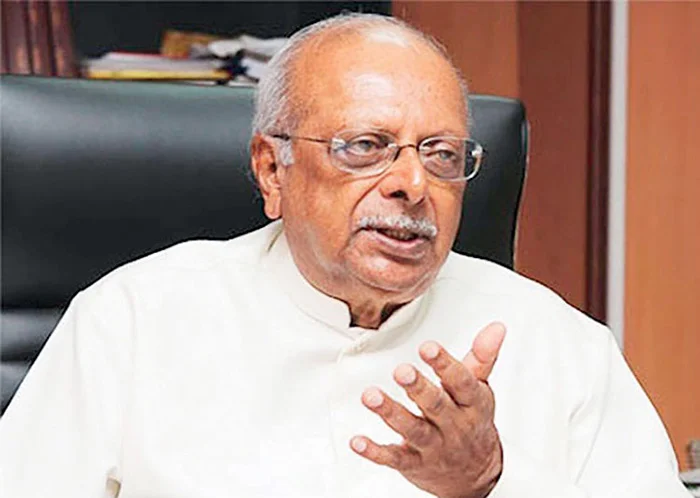
Multi-gifted Prof. Tissa Vitarana in passing,
Leaves a glowing gem of a memory comforting,
Of him putting his best foot forward in public,
Alongside fellow peace-makers in the nineties,
In the name of a just peace in bloodied Sri Lanka,
Caring not for personal gain, barbs or brickbats,
And for such humanity he’ll be remembered….
Verily a standard bearer of value-based politics.
By Lynn Ockersz
-

 Business6 days ago
Business6 days agoMinistry of Brands to launch Sri Lanka’s first off-price retail destination
-

 Latest News2 days ago
Latest News2 days agoNew Zealand meet familiar opponents Pakistan at spin-friendly Premadasa
-

 Latest News2 days ago
Latest News2 days agoTariffs ruling is major blow to Trump’s second-term agenda
-

 Latest News2 days ago
Latest News2 days agoECB push back at Pakistan ‘shadow-ban’ reports ahead of Hundred auction
-
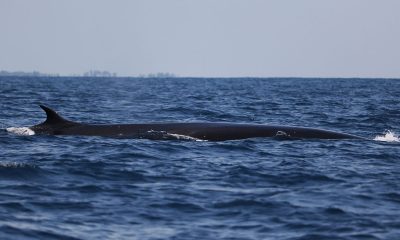
 Features6 days ago
Features6 days agoGiants in our backyard: Why Sri Lanka’s Blue Whales matter to the world
-

 Sports3 days ago
Sports3 days agoOld and new at the SSC, just like Pakistan
-

 News2 days ago
News2 days agoConstruction begins on country’s largest solar power project in Hambantota
-
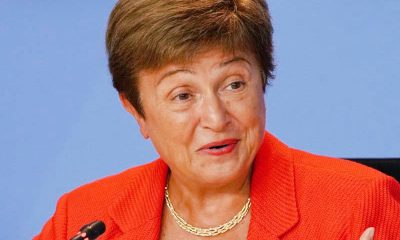
 News5 days ago
News5 days agoIMF MD here


